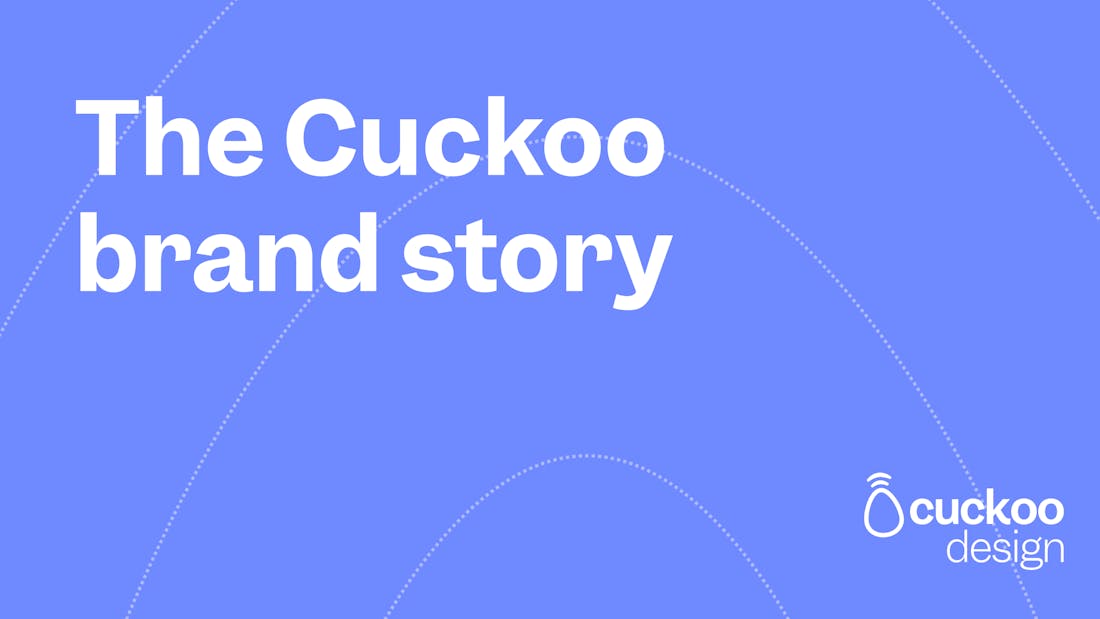
- ArticlesDesign
They quoted us £75,000, so we did it ourselves: the Cuckoo brand story
After being told by top London agencies it would cost upwards of £75,000 to develop our brand; we decided to embrace the challenge and keep it in-house.
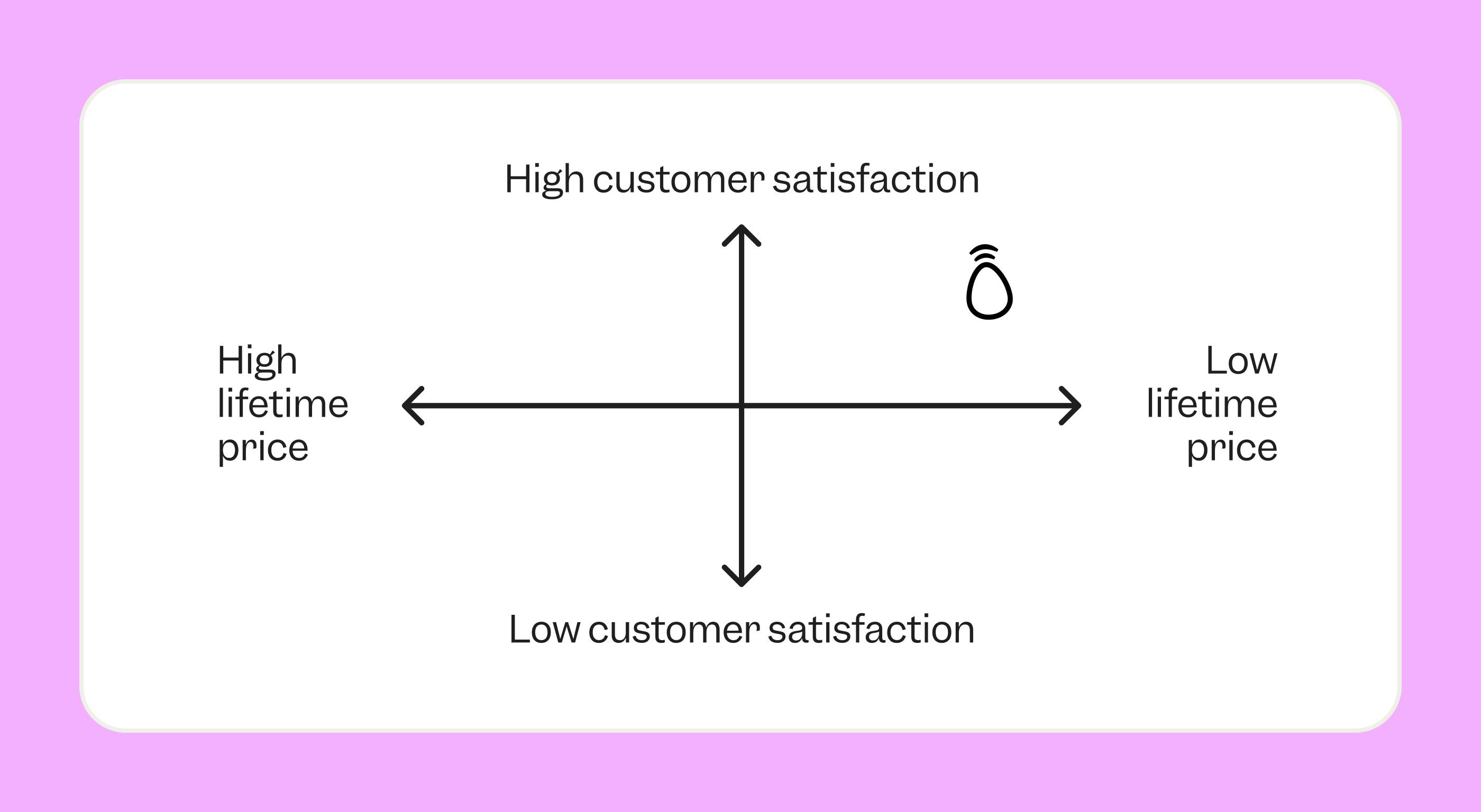
When it comes to pricing, the current crop of providers aren’t doing a great job. This isn’t just me saying so: criticism has come from, among others, the likes of The Times, The Daily Mail, The Mirror, The Daily Star, The Daily Telegraph, The Sun, The Guardian… unanimous support across the press spectrum that politicians could only dream of. In short, the broadband market all too often reflects a broken, oligopolistic market.
Here’s how we’re disrupting it.
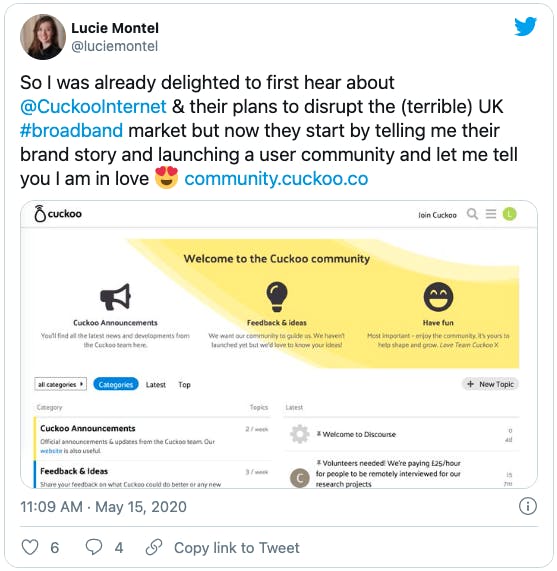
First of all, anyone who’s gone on a broadband website will know that there are a ridiculously large number of deal options. TalkTalk, for example, have five different deals on their website: Faster Fibre , Superfast Fibre , Faster 150 Fibre , Fast Broadband and Ultra Fibre Optic . That’s before you get onto their call packages ( Unlimited UK Calls or International Max) , TV options (would you like TalkTalk TV, TalkTalk TV Box, TalkTalk TV Plus Box, TalkTalk TV multi-room, TV Select, TV Entertainment, TV Kids, or Sky Cinema) and choosing between the Super Router and All new Wi-Fi Hub . By my calculation that’s 360(!) different potential combinations of deals. No wonder we find it hard picking the right one for us.
But even when looking at a single deal, prices are opaque and difficult to understand. In a study by the Advertising Standards Authority, only 23% of individuals were able to correctly identify the total cost per month of a broadband deal when looking at an ad for the first time. The vast majority were left confused and misled. It’s no wonder that we end up on expensive and complex contracts.
Ofcom estimate that 8.8 million households in the UK are paying around £100 per year more than they should . Why? Simply because they got to the end of their contract and trusted that their provider would give them a fair deal. Instead, the vast majority of current providers hike prices at a contract’s end. It’s a tax on loyalty . At the time of writing, the infamous leader of the pack is Virgin Media’s M50 tariff, which increases by a whopping £192 per year after 12 months. In terms of relative increase, the winner is Post Office’s 11Mbps package, which increases by 67% 12 months in. Lovely.
Every day 25,000 broadband customers come to the end of their contract — and the majority of those see an automatic price rise.
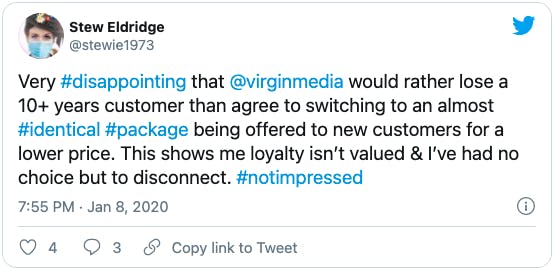
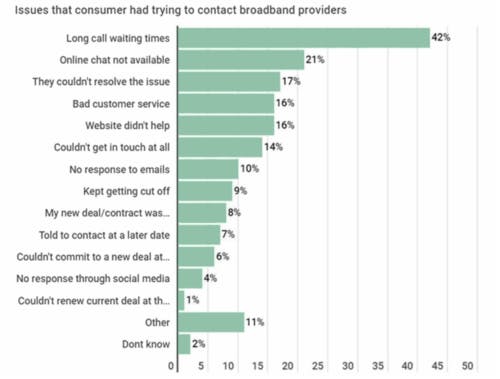
Some plucky individuals will read the above and decide to raise it with their provider. Good luck to you. Negotiating a new deal is protracted, complex and painful. First, you might have to navigate your provider’s website to even find a way to contact them — no mean feat, since many providers make it as difficult to get in touch as possible. Then, having waited in a call queue for an hour or so, be prepared to listen to various explanations as to why you, as a loyal customer, are not allowed to receive anywhere near the same deal as new shiny customers who want to join for the first time. You may then generously be offered a pound or two off your current price, still likely far more expensive than introductory offers.
Perhaps instead you need to leave your contract early. There can be valid reasons; we get that people’s plans change. But most providers don’t agree, and instead charge exorbitant fees if you need to leave — far above what anyone could consider reasonable. Our CEO’s dad was trying to leave BT and was threatened with a £400 fine for ending his contract early. Want to challenge the fine? See above.
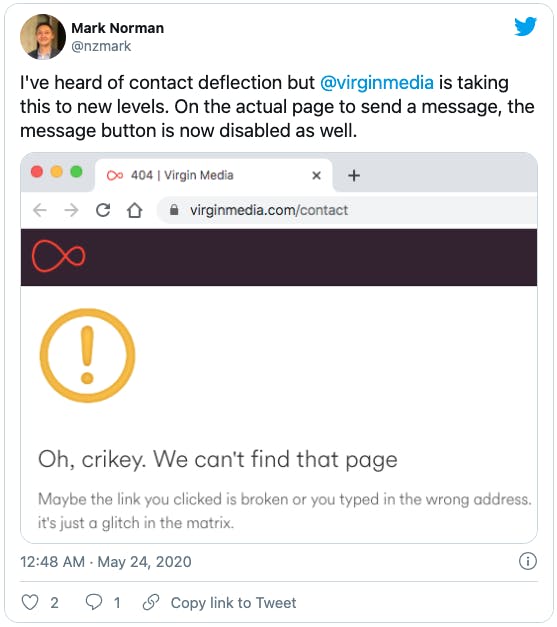
Thankfully, we are seeing progress. In the past Ofcom have fined EE and Virgin Media millions for levying excessive charges to customers who ended their contracts early. And Ofcom are now requiring companies to tell customers about their best deals when they reach the end of their contract. At least, they were just about to - until Coronavirus hit and they decided to delay enforcement.
“We know charging loyal customers more is unfair and not nice, but we make billions from it. It’s a battle between the commercial and strategic arms of the business”
- Anonymous
senior executive at a top 5 UK ISP, May 2020
But we think that change is always best when it comes from the industry itself. From the bottom-up. It shouldn’t be the regulators job to require us to treat paying customers with respect.
And so when we set up Cuckoo, we wanted its approach to be distinctive. Refreshingly distinctive. But what exactly would that look like?
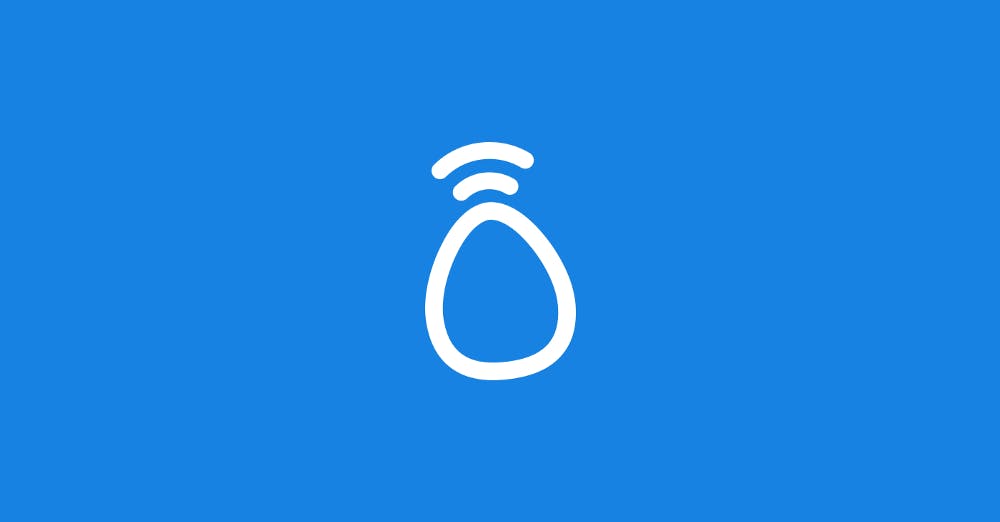
We started by setting out the overarching principles that should shape our approach to pricing. These, we resolved, would guide how, what and when we charged our customers.
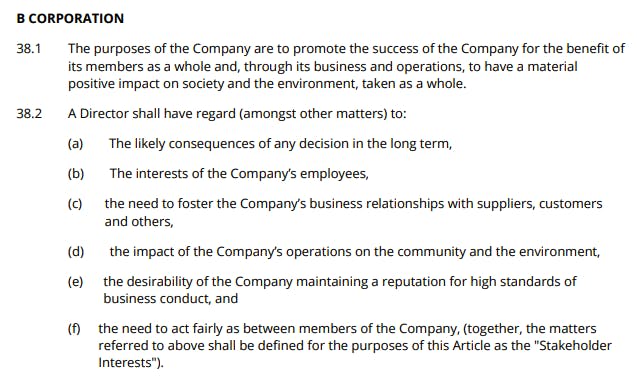
These principles provided our framework. But to get to the specific details, we needed to reach out to our customer base.
First, we Cuckoo Community and tested our pricing ideas directly with members of the public. This was great. It wasn’t easy — several people said we needed to rethink our approach. But that was exactly the feedback we needed as we refined our proposition. We got a bunch of ideas that we hadn’t considered, and we got a sense of what people cared about most.
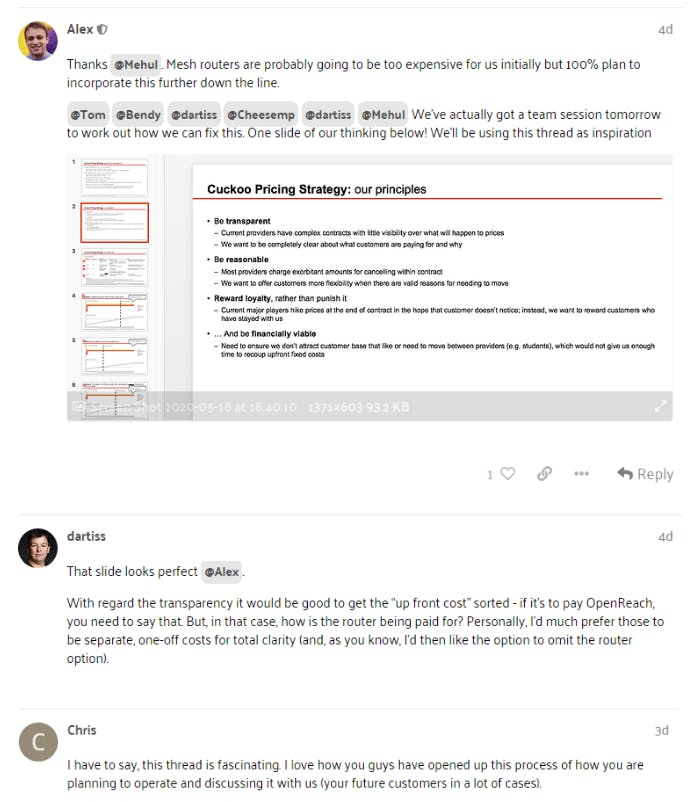
Second, we ran a survey . We tested a bunch of price points against our competitors’ offerings with a group of about 1000. This was costly but it was a great way of getting some aggregated feedback to complement our individual verbatim thoughts from the Community.
“24% of people are more likely to change broadband provider due to Coronavirus”
- Cuckoo national market research
May 2020
Third, we built a financial model . We needed to work out what would be sustainable in the long-run under what assumptions, and test different scenarios. This helped us really get to the final answer and manage the trade-off between affordability, financial sustainability and quality of service.
That was our approach. And here’s what we’ve come up with.
One fast speed. One month rolling. No end of contract price rises.

You’ll pay £29.99 each month for your broadband. No fixed contract length; no post-contract loyalty tax. And only one deal (much like Bulb having one tariff). We might need to increase prices in line with inflation in future years (we’ll try not to!), but if it does, it will increase by the same amount for everyone. This monthly price was originally going to be higher, but feedback from our community adjusted this price!
And a £60 connection cost. We thought hard about this. We know that an upfront cost might put off some customers. However, each time someone joins our network we need to pay Openreach about £60 to switch them over; and we’d rather be transparent about that rather than tying you into a long contract. An upfront cost has proved manageable and successful at other companies — like ByMiles. What’s more, we hope to allow you to spread out your upfront cost over time via Klarna. We also buy you a good quality router — but we’ll give that to you for free as long as you send it back to us if you leave 😢.
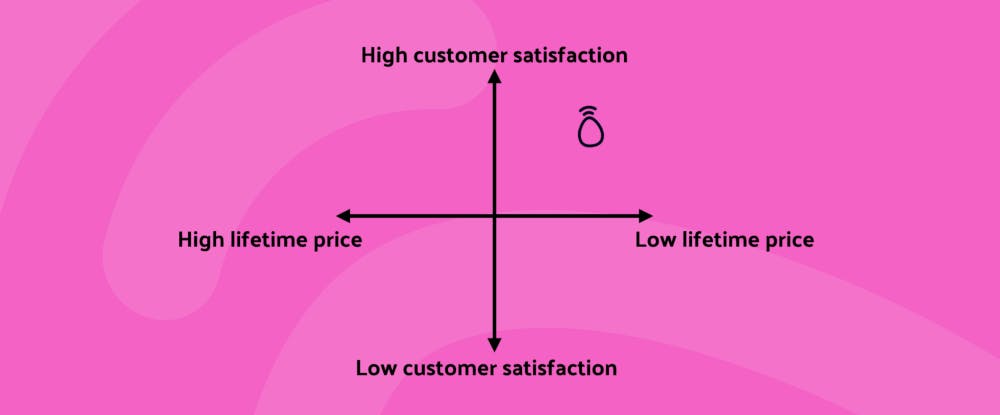
What’s more, we’ll introduce a loyalty bonus. We commit to rewarding our most loyal customers — those who stay with us for many years. The longer you stay, the price will go down. Being entirely transparent, we need to monitor our financials and churn rates over the coming year before confirming the exact details and the size of our loyalty bonus; but watch this space.
But… our approach isn’t set in stone. This is our best attempt off the back of the work we’ve done and a few weeks of being live. To pivot, is to startup.
Think there’s a better approach? Great. Tell us. 🔊 We’d love to hear what you think, and consider whether it works for us. Contact us at hello@cuckoo.co or join the conversation on Twitter.

After being told by top London agencies it would cost upwards of £75,000 to develop our brand; we decided to embrace the challenge and keep it in-house.